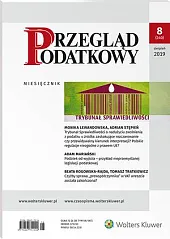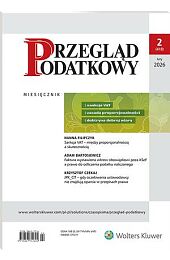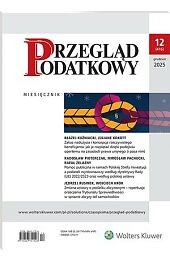Przegląd Podatkowy - Nr 8/2019 [340]
Opis publikacji
Przegląd Podatkowy jest jednym z nielicznych periodyków o tematyce podatkowej, tak wysoko ocenianym przez doradców podatkowych, biegłych rewidentów, pracowników organów podatkowych oraz prawników, dyrektorów finansowych i księgowych. Publikacje są pogrupowane w poszczególnych działach. Artykuł poświęcony najważniejszemu zagadnieniu w danym miesiącu jest prezentowany jako “Temat miesiąca”.
Pozostałe artykuły (poświęcone analizie spornych i skomplikowanych zagadnień podatkowych) są zamieszczane w działach: „Podatki”, „Ordynacja Podatkowa”, „Krajowa Administracja Skarbowa”, „Postępowanie przed SA”, „Postępowanie egzekucyjne”, „Prawo karne skarbowe”. Dział “Orzecznictwo” zawiera przegląd ważniejszych orzeczeń polskich sądów administracyjnych oraz wyroków Trybunału Sprawiedliwości.
Za publikację na łamach „Przeglądu Podatkowego” Autor otrzymuje 40 pkt (zgodnie z załącznikiem do komunikatu Ministra N...
Przegląd Podatkowy jest jednym z nielicznych periodyków o tematyce podatkowej, tak wysoko ocenianym przez doradców podatkowych, biegłych rewidentów, pracowników organów podatkowych oraz prawników, dyrektorów finansowych i księgowych. Publikacje są pogrupowane w poszczególnych działach. Artykuł poświęcony najważniejszemu zagadnieniu w danym miesiącu jest prezentowany jako “Temat miesiąca”.
Pozostałe artykuły (poświęcone analizie spornych i skomplikowanych zagadnień podatkowych) są zamieszczane w działach: „Podatki”, „Ordynacja Podatkowa”, „Krajowa Administracja Skarbowa”, „Postępowanie przed SA”, „Postępowanie egzekucyjne”, „Prawo karne skarbowe”. Dział “Orzecznictwo” zawiera przegląd ważniejszych orzeczeń polskich sądów administracyjnych oraz wyroków Trybunału Sprawiedliwości.
Za publikację na łamach „Przeglądu Podatkowego” Autor otrzymuje 40 pkt (zgodnie z załącznikiem do komunikatu Ministra Nauki z 5.01.2024 r. w sprawie wykazu czasopism naukowych i recenzowanych materiałów z konferencji międzynarodowych, wydanego na podstawie na podstawie art. 267 ust. 3 ustawy z 20.07.2018 r. – Prawo o szkolnictwie wyższym i nauce, Dz.U. z 2024 r. poz. 1571 ze zm.). Czasopismo jest ujęte w międzynarodowej bazie European Reference Index for the Humanities and Social Sciences (ERIH+).
Czasopismo jest indeksowane w bazie ICI Journals Master List za rok 2024 (ICV 2024 = 60.87).
Informacje
Spis treści
Table of Contents
Redakcja
Kontakt
Dział Publikacji Periodycznych:
Wolters Kluwer Polska Sp. z o.o.
ul. Przyokopowa 33
01-208 Warszawa
e-mail: czasopisma@wolterskluwer.pl
tel: 22 535 82 19
www.czasopisma.wolterskluwer.pl
Dyrektor Działu Publikacji Periodycznych
Klaudia Szawłowska
klaudia.szawlowska@wolterskluwer.com
Numery czasopisma
Przegląd Podatkowy - Nr 2/2026 [418]
Przegląd Podatkowy - Nr 1/2026 [417]
Przegląd Podatkowy - Nr 12/2025 [416]
Przegląd Podatkowy - Nr 11/2025 [415]
Przegląd Podatkowy - Nr 10/2025 [414]
Przegląd Podatkowy - Nr 9/2025 [413]
Przegląd Podatkowy - Nr 8/2025 [412]
Przegląd Podatkowy - Nr 7/2025 [411]
Przegląd Podatkowy - Nr 6/2025 [410]
Przegląd Podatkowy - Nr 5/2025 [409]
Przegląd Podatkowy - Nr 4/2025 [408]
Przegląd Podatkowy - Nr 3/2025 [407]
Przegląd Podatkowy - Nr 2/2026 [418]
Przegląd Podatkowy - Nr 1/2026 [417]
Przegląd Podatkowy - Nr 12/2025 [416]
Przegląd Podatkowy - Nr 11/2025 [415]
Przegląd Podatkowy - Nr 10/2025 [414]
Przegląd Podatkowy - Nr 9/2025 [413]
Przegląd Podatkowy - Nr 8/2025 [412]
Przegląd Podatkowy - Nr 7/2025 [411]
Przegląd Podatkowy - Nr 6/2025 [410]
Przegląd Podatkowy - Nr 5/2025 [409]
Przegląd Podatkowy - Nr 4/2025 [408]
Przegląd Podatkowy - Nr 3/2025 [407]
Przegląd Podatkowy - Nr 2/2025 [406]
Przegląd Podatkowy - Nr 1/2025 [405]
Przegląd Podatkowy - Nr 12/2024 [404]
Przegląd Podatkowy - Nr 11/2024 [403]
Przegląd Podatkowy - Nr 10/2024 [402]
Przegląd Podatkowy - Nr 9/2024 [401]
Przegląd Podatkowy - Nr 8/2024 [400]
Przegląd Podatkowy - Nr 7/2024 [399]
Przegląd Podatkowy - Nr 6/2024 [398]
Przegląd Podatkowy - Nr 5/2024 [397]
Przegląd Podatkowy - Nr 4/2024 [396]
Przegląd Podatkowy - Nr 3/2024 [395]
Przegląd Podatkowy - Nr 2/2024 [394]
Przegląd Podatkowy - Nr 1/2024 [393]
Przegląd Podatkowy - Nr 12/2023 [392]
Przegląd Podatkowy - Nr 11/2023 [391]
Przegląd Podatkowy - Nr 10/2023 [390]
Przegląd Podatkowy - Nr 9/2023 [389]
Przegląd Podatkowy - Nr 8/2023 [388]
Przegląd Podatkowy - Nr 7/2023 [387]
Przegląd Podatkowy - Nr 6/2023 [386]
Przegląd Podatkowy - Nr 5/2023 [385]
Przegląd Podatkowy - Nr 4/2023 [384]
Przegląd Podatkowy - Nr 3/2023 [383]
Przegląd Podatkowy - Nr 2/2023 [382]
Przegląd Podatkowy - Nr 1/2023 [381]
Przegląd Podatkowy - Nr 12/2022 [380]
Przegląd Podatkowy - Nr 11/2022 [379]
Przegląd Podatkowy - Nr 10/2022 [378]
Przegląd Podatkowy - Nr 9/2022 [377]
Przegląd Podatkowy - Nr 8/2022 [376]
Przegląd Podatkowy - Nr 7/2022 [375]
Przegląd Podatkowy - Nr 6/2022 [374]
Przegląd Podatkowy - Nr 5/2022 [373]
Przegląd Podatkowy - Nr 4/2022 [372]
Przegląd Podatkowy - Nr 3/2022 [371]
Przegląd Podatkowy - Nr 2/2022 [370]
Przegląd Podatkowy - Nr 1/2022 [369]
Przegląd Podatkowy - Nr 12/2021 [368]
Przegląd Podatkowy - Nr 11/2021 [367]
Przegląd Podatkowy - Nr 10/2021 [366]
Przegląd Podatkowy - Nr 9/2021 [365]
Przegląd Podatkowy - Nr 8/2021 [364]
Przegląd Podatkowy - Nr 7/2021 [363]
Przegląd Podatkowy - Nr 6/2021 [362]
Przegląd Podatkowy - Nr 5/2021 [361]
Przegląd Podatkowy - Nr 4/2021 [360]
Przegląd Podatkowy - Nr 3/2021 [359]
Przegląd Podatkowy - Nr 2/2021 [358]
Przegląd Podatkowy - Nr 1/2021 [357]
Przegląd Podatkowy - Nr 12/2020 [356]
Przegląd Podatkowy - Nr 11/2020 [355]
Przegląd Podatkowy - Nr 10/2020 [354]
Przegląd Podatkowy - Nr 9/2020 [353]
Przegląd Podatkowy - Nr 8/2020 [352]
Przegląd Podatkowy - Nr 7/2020 [351]
Przegląd Podatkowy - Nr 6/2020 [350]
Przegląd Podatkowy - Nr 5/2020 [349]
Przegląd Podatkowy - Nr 4/2020 [348]
Przegląd Podatkowy - Nr 3/2020 [347]
Przegląd Podatkowy - Nr 2/2020 [346]
Przegląd Podatkowy - Nr 1/2020 [345]
Przegląd Podatkowy - Nr 12/2019 [344]
Przegląd Podatkowy - Nr 11/2019 [343]
Przegląd Podatkowy - Nr 10/2019 [342]
Przegląd Podatkowy - Nr 9/2019 [341]
Przegląd Podatkowy - Nr 8/2019 [340]
Przegląd Podatkowy - Nr 7/2019 [339]
Przegląd Podatkowy - Nr 6/2019 [338]
Przegląd Podatkowy - Nr 5/2019 [337]
Przegląd Podatkowy - Nr 4/2019 [336]
Przegląd Podatkowy - Nr 3/2019 [335]
Przegląd Podatkowy - Nr 2/2019 [334]
Przegląd Podatkowy - Nr 1/2019 [333]
Przegląd Podatkowy - Nr 12/2018 [332]
Przegląd Podatkowy - Nr 11/2018 [331]
Przegląd Podatkowy - Nr 10/2018 [330]
Przegląd Podatkowy - Nr 9/2018 [329]
Przegląd Podatkowy - Nr 8/2018 [328]
Przegląd Podatkowy - Nr 7/2018 [327]
Przegląd Podatkowy - Nr 6/2018 [326]
Przegląd Podatkowy - Nr 5/2018 [325]
Przegląd Podatkowy - Nr 4/2018 [324]
Przegląd Podatkowy - Nr 3/2018 [323]
Przegląd Podatkowy - Nr 2/2018 [322]
Przegląd Podatkowy - Nr 1/2018 [321]
Przegląd Podatkowy - Nr 12/2017 [320]
Przegląd Podatkowy - Nr 11/2017 [319]
Przegląd Podatkowy - Nr 10/2017 [318]
Przegląd Podatkowy - Nr 9/2017 [317]
Przegląd Podatkowy - Nr 8/2017 [316]
Przegląd Podatkowy - Nr 7/2017 [315]
Przegląd Podatkowy - Nr 6/2017 [314]
Przegląd Podatkowy - Nr 5/2017 [313]
Przegląd Podatkowy - Nr 4/2017 [312]
Przegląd Podatkowy - Nr 3/2017 [311]
Przegląd Podatkowy - Nr 2/2017 [310]
Przegląd Podatkowy - Nr 1/2017 [309]
Przegląd Podatkowy - Nr 12/2016 [308]
Przegląd Podatkowy - Nr 11/2016 [307]
Przegląd Podatkowy - Nr 10/2016 [306]
Przegląd Podatkowy - Nr 9/2016 [305]
Przegląd Podatkowy - Nr 8/2016 [304]
Przegląd Podatkowy - Nr 7/2016 [303]
Przegląd Podatkowy - Nr 6/2016 [302]
Przegląd Podatkowy - Nr 5/2016 [301]
Przegląd Podatkowy - Nr 4/2016 [300]
Przegląd Podatkowy - Nr 3/2016 [299]
Przegląd Podatkowy - Nr 2/2016 [298]
Przegląd Podatkowy - Nr 1/2016 [297]
Przegląd Podatkowy - Nr 12/2015 [296]
Przegląd Podatkowy - Nr 11/2015 [295]
Przegląd Podatkowy - Nr 10/2015 [294]
Przegląd Podatkowy - Nr 9/2015 [293]
Przegląd Podatkowy - Nr 8/2015 [292]
Przegląd Podatkowy - Nr 7/2015 [291]
Przegląd Podatkowy - Nr 6/2015 [290]
Przegląd Podatkowy - Nr 5/2015 [289]
Przegląd Podatkowy - Nr 4/2015 [288]
Przegląd Podatkowy - Nr 3/2015 [287]
Przegląd Podatkowy - Nr 2/2015 [286]
Przegląd Podatkowy - Nr 1/2015 [285]
Przegląd Podatkowy - Nr 12/2014 [284]
Przegląd Podatkowy - Nr 11/2014 [283]
Przegląd Podatkowy - Nr 10/2014 [282]
Przegląd Podatkowy - Nr 9/2014 [281]
Przegląd Podatkowy - Nr 8/2014 [280]
Przegląd Podatkowy - Nr 7/2014 [279]
Przegląd Podatkowy - Nr 6/2014 [278]
Przegląd Podatkowy - Nr 5/2014 [277]
Przegląd Podatkowy - Nr 4/2014 [276]
Przegląd Podatkowy - Nr 3/2014 [275]
Opinie

w LEX Czasopisma
Pierwszy miesiąc 50% taniej!





